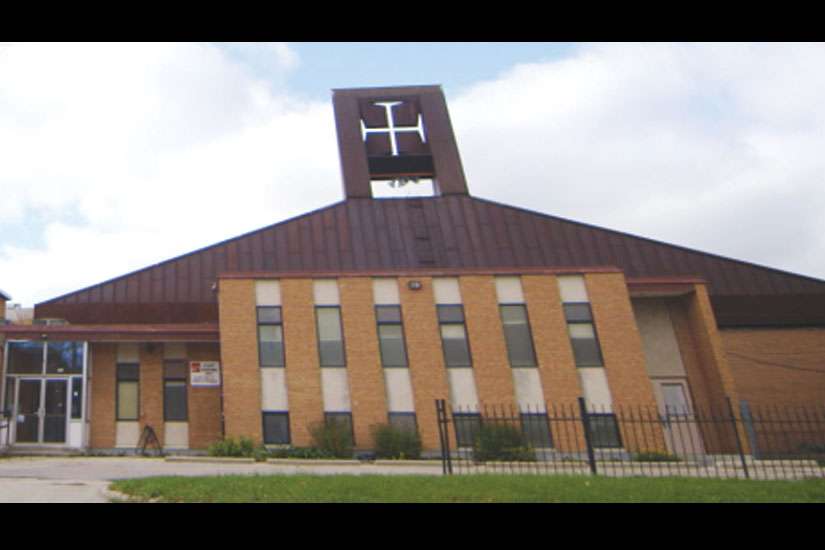In January Point Douglas neighbourhood community activist James Favel and social worker Larry Morrissette published an angry call for the Gonzaga Middle School to put a halt to plans to set up shop this fall in the area just north of Winnipeg’s downtown core — an area where household incomes average about half the average for the city and more than one-third of residents are aboriginal.
A Catholic school with a Catholic culture means another attempt to strip indigenous kids of their own culture and spiritual traditions, the two said.
“On the heels of the Truth and Reconciliation (Commission) findings and recommendations, it’s kind of a big middle finger to everybody,” Favel told The Catholic Register.
“The Catholic Church has caused us enough damage. It is time for this to stop,” wrote Favel and Morrissette on the CBC News web site.
This version of what Gonzaga is all about is inaccurate, uninformed and insulting, as far as Gonzaga president Tom Lussier is concerned.
“Comparisons between us and a residential school are just odious,” said Lussier.
Gonzaga Middle School will be Canada’s second Nativity School. Mother Teresa Middle School in Regina is the first. There are 60 such schools in the United States.
The Nativity School concept was pioneered by Jesuits in American inner cities beginning in the early 1970s. The idea is to offer families an extended and intensive educational program in the most critical years leading up to high school. Nativity Schools have built a reputation for breaking the cycle of poverty. Longer school days, a longer school year, smaller class sizes, one-on-one tutoring, social work support for kids and their families and mentoring that follows students through high school and university are all part of the model.
Favel and Morrissette characterize this as a “country club” education offered in exchange for conformity to Catholic religious practice.
The Gonzaga advisory board includes professor Niigaan Sinclair, acting department head of Native Studies at the University of Manitoba. A “Statement of Reconciliation” posted to the Gonzaga Middle School web site was co- written by Sinclair’s father, Justice Murray Sinclair, who headed up the Truth and Reconciliation Commission.
Lussier is not an outsider who has invaded Winnipeg with a formula to solve North Winnipeg’s problems. He was born and raised in the city and spent 35 years working at St. Paul’s, the Jesuit high school in Winnipeg, 11 years as principal before he took on the challenge of Gonzaga.
“We think the public school system in Winnipeg is doing a lot of very good work. But there remains the need, based on research, for more resources being brought to bear in northeast downtown and the Point Douglas area,” Lussier said. “Those are the two areas of the city that are most affected by socioeconomic disadvantage.”
Regina’s Mother Teresa Middle School opened its doors five years ago. As the school’s first students now make their way through Grade 10, the school is gaining trust in the native community.
“You’re dealing with a group of people who don’t trust easily, and rightfully so,” said Mother Teresa executive director Curtis Kleisinger. “We’ve gone from 50 per cent aboriginal-First Nations to 82 per cent this year. Next year, we’ll probably be in the 90s. That shows you we’re gaining faith in the aboriginal community, with the grandmothers.”
The idea that a Jesuit-inspired school would try to separate anybody from their own culture or faith is ridiculous, said Kleisinger.
“As a matter of fact, I’m focusing on your identity and your culture and helping you explore who you are,” he said. “Most of my students came from the Catholic system. The parents have already made the decision to have them in a Catholic school. I’m not stripping anybody of their culture.”
Students and families choose to go to Mother Teresa. They go through an interview process before they are accepted. Nativity Schools are not residential. Students live with their families and families are supported through the school.
Students who rarely turned up in class before their experience at Mother Teresa are now in high school averaging 92-per-cent attendance.
“We’ve had kids who have lost every member of their family, who have really struggled and have really been angry and have had to battle through things,” said Kleisinger. “But now they’re in school doing incredibly well, engaged in all kinds of activities and want to be marine biologists.”
Lussier is quick to point out the idea behind Nativity Schools is not to target any ethnic, racial or religious minority. The aim is to give poor kids an education that will change their life prospects.
Lussier makes no apology for offering a Catholic education, but sees that as the furthest thing from some form of proselytism or brainwashing.
“The approach we are taking is perhaps a little bit more sensitive to the history of residential schools and that’s partly because in Winnipeg we have the largest urban indigenous population in Canada,” he said. “We will include in the curriculum of this school teaching on indigenous culture and history in Canada in a way that respects the fact that we are all treaty people and we have a shared history.”


